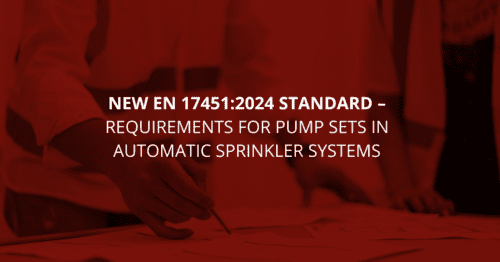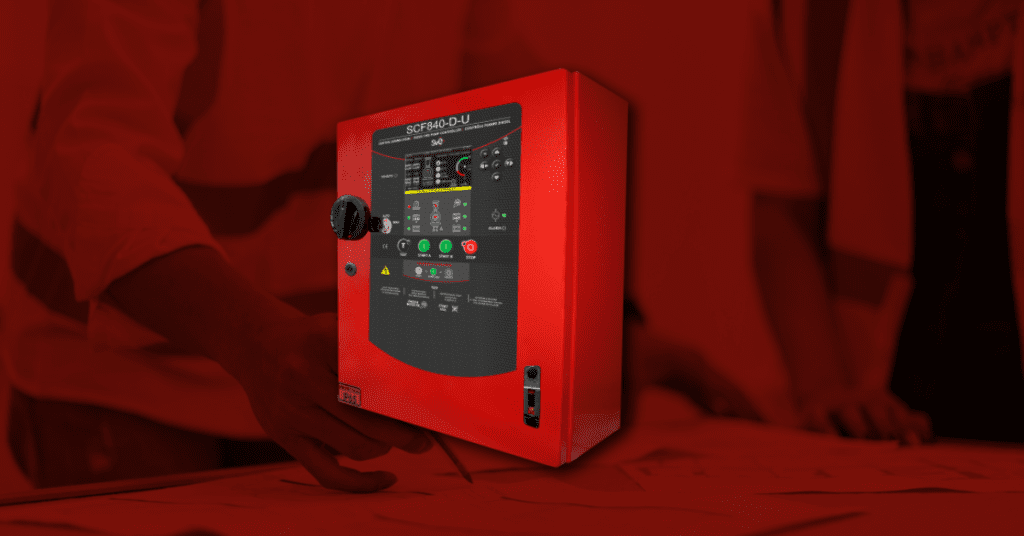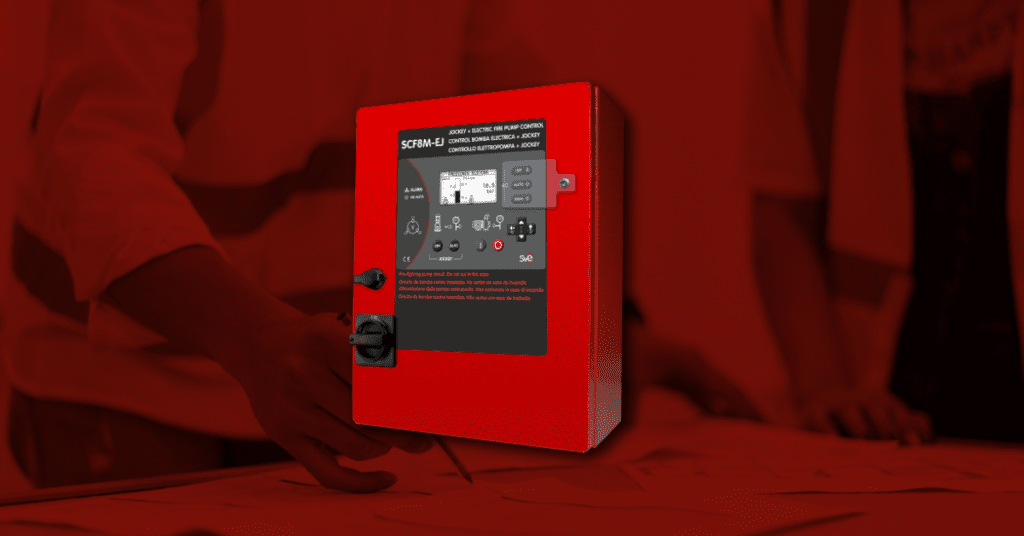
What does the EN 17451:2024 standard regulate?
The European standard EN 17451:2024 establishes the requirements for the design, assembly, installation, and commissioning of pump sets, powered by either electric or diesel engines, that supply automatic sprinkler systems in accordance with EN 12845:2015+A1:2019.
Why was this new standard necessary?
EN 17451:2024 addresses several existing regulatory gaps and resolves recurring technical issues:
-
Lack of detail in EN 12845
While EN 12845 mentioned pumps, it did not provide specific criteria regarding the design, selection, assembly, control, testing, or documentation of pump sets.
-
Need for technical harmonization in Europe
The new standard aims to unify technical criteria across Europe, ensuring that competent authorities (fire departments, insurers, engineering firms) share a common technical framework.
-
Clarification of roles
It clearly defines the responsibilities of the pump set manufacturer (design, integration, documentation, testing), the installer (final assembly, alignment, on-site testing), and the system designer (hydraulic specifications, operating conditions, environmental requirements).
-
Technological update
The standard includes modern technologies such as electric motors with VFD, advanced control panels, diesel engines with ECM, automatic starting systems, multiple batteries, and remote monitoring systems.
What are the key technical aspects of the EN 17451:2024 standard?
The EN 17451:2024 standard focuses on detailed criteria for all components of a pump set in sprinkler systems. Unlike previous standards, it precisely defines what should be included, how it should be designed, and under what conditions it must be installed and tested.
Which components are covered by the standard?
The standard specifically outlines the following components of a complete pump set:
- Pump: The core of the system, which must meet specific hydraulic requirements.
- Couplings: Critical elements connecting the motor and pump; selection must consider torque calculations and safety factors.
- Motor: May be electric or diesel, with starting, protection, cooling, and control requirements.
- Control panel: Must include indicators, alarms, IP protections, redundancy, and supervision capability.
- Cabling: Proper sizing, thermal protection, insulation, and compatibility with industrial environments.
- Mounting base: Must ensure stability and alignment, considering vibration and mechanical stress.
- Fuel tank (for diesel): Dimensions, materials, filling systems, ventilation, and leakage control.
Beyond the components, EN 17451:2024 also clearly defines the technical and functional aspects required to ensure the safety, reliability, and performance of these systems in fire protection installations.
- Design criteria: Required flow and pressure, NPSHa, impeller type, environmental conditions, and cooling systems.
- Coupling selection and torque calculations: Including safety factors (SFk) and torque formulas.
- Electrical installation and motor starting: Protections, VFD, controllers, and cabling.
- Specific requirements for diesel engines: Tanks, cooling, exhaust, emergency start-up.
- Control panel requirements: Indicators, alarms, IP protection, redundant controls.
- Commissioning tests and documentation.
- Maintenance and installer responsibilities.
- Informative annexes and technical guidance: Includes diagrams, installation examples, and guidance for designers and evaluating authorities, along with details on electric and diesel motors.
Harmonization with existing European standards
EN 17451:2024 is a harmonized European standard, which means all CEN (European Committee for Standardization) member countries—including Spain, Germany, and France—are required to adopt it as a national standard. In case of conflict with existing standards, those must be adapted or revised to align with the new European directive for pump sets in sprinkler systems.
Spain – UNE 23500:2021
Since its latest version, UNE 23500 has been designed as a complementary standard to EN 12845. EN 17451:2024 is now integrated as a specific reference for pump sets, without direct conflict with UNE 23500, although it can:
- Reinforce hydraulic sizing criteria and construction requirements.
- Act as a higher technical standard in projects governed by European regulations such as the RSCIEI.
Future revisions of UNE 23500 are expected to include explicit references to EN 17451, as it already does with EN 12845.
Germany – VdS 2100-21 and VdS 2100-22
In Germany, EN 17451:2024 directly conflicts with several sections of the VdS 2100 standards. However, VdS is currently undergoing a major review process of its standards to harmonize them with EN 17451.
France – APSAD T1-1 and T1-2
France will adopt EN 17451 as NF EN 17451, integrating it into its national regulatory framework. However, APSAD T1-1 and T1-2 will remain in effect as complementary certifications or higher-level technical guarantees, serving as references in specific evaluation or certification contexts.
Comparison of control panel requirements under main European standards
To facilitate the technical evaluation of control panels used in sprinkler systems, the following section presents a detailed comparison between the requirements of EN 17451:2024 and other European standards such as UNE 23500, APSAD, and VdS. Key aspects analyzed include IP protection, startup methods, redundancy, alarms, supervision, and access levels.
Control panels for electric pumps: regulatory comparison
| Requirement | UNE 23500 | EN 17451 | APSAD T1-2 | VdS 2100-21 |
| Minimum IP protection | IP54 (EN 60529) | IP54 (EN 60529) | IP44 | IP54 (DIN EN 60529) |
| Operating temperature | Not specified in values | -5°C to +40°C | 0°C to +50°C | -5°C to +40°C |
| Power redundancy (only for diesel) | Not applicable | Yes, depending on the environment | Not explicitly stated | Yes |
| Allowed starting methods | Direct or reduced voltage start | Direct, star-delta, VFD, soft start | Direct, star-delta, VFD, soft start | Direct, star-delta, transformer, soft start |
| Pressure supervision | Yes, with fault detection | Yes, two independent sensors | Yes | Yes |
| Visual/audible alarms | Yes, with event analyzer | Yes, with EMC requirements | Yes | Yes |
| Automatic restart | Not specified | Yes | Yes | Yes |
| Start on low pressure | Yes, via pressure switch or transmitter | Yes | Yes | Yes |
| Access and security levels | Key anti-tamper access control | Yes, restricted access | Yes, 4 access levels | No level detail, but enclosure present |
| Signaling and display devices | LED lights or graphic displays | Yes, display and alarms | Yes, LED + display | Yes |
| Fault protection and monitoring | Mandatory event logging (Annex G) | Yes, with diagnostics and logging | Yes, includes dry contacts | Yes, thermal and electrical fault protection |
Control panels for diesel pumps: regulatory comparison
| Requirement | UNE 23500 | EN 17451 | APSAD T1-1 | VdS 2100-22 |
|---|---|---|---|---|
| Minimum IP protection | IP54 (EN 60529) | IP54 (EN 60529) | IP44 | IP54 (DIN EN 60529) |
| Operating temperature | Not specified in values | -5°C to +40°C | 0°C to +50°C | -5°C to +40°C |
| Power redundancy (batteries) | Yes (2 batteries) | Yes (2 batteries + 2 chargers) | Yes (2 batteries and 2 chargers) | Yes (2 batteries) |
| Number of start attempts | 6 | 6 attempts | 6 attempts (15 sec each) | Up to 6 |
| Pressure supervision | Yes | Yes (2 independent sensors) | Yes | Yes |
| Visual/audible alarms | Yes, event analyzer | Yes, full monitoring | Yes | Yes |
| Start on low pressure | Yes | Yes | Yes | Yes |
| ECM controller | Not specified (not prohibited) | Yes (Annex E) | No (not considered) | No |
| Access and security levels | Anti-tamper key | Yes, enclosure and lock | Yes, 4 levels | Yes |
| Signaling and display devices | Yes (indicators, display) | Yes (full display) | Yes (LED + display) | Yes |
| Fault protection and monitoring | Yes, includes logging (Annex G) | Yes, with diagnostics and retention | Yes, software, batteries, chargers faults | Yes, including temperature,voltages, thermal tests |
SVE control panel compliance with EN 17451:2024
The following two tables show how SVE Corp’s control panel models—for both diesel and electric pumps—align with the specific requirements of EN 17451:2024. This comparison helps assess the technical adequacy of SVE products in line with the most demanding standard currently in force for pump sets in sprinkler systems.
SCF840-D-U – Diesel pump control panel
| EN 17451 Requirement | SVE Compliance | Comment |
|---|---|---|
| Minimum IP54 protection | Yes | IP65 enclosure |
| Redundant starting method | Yes (optional) | Master/Backup function for electrical redundancy |
| Phase and mains voltage supervision | Yes | Voltmeters, frequency meter, and phase sequence |
| Low-pressure detection | Yes | Pressure switch + pressure transducer (4–20mA) |
| Pressure switch line supervision | Yes | Open circuit and short circuit diagnostics |
| Remote communication | Yes | Modbus RTU / TCP-IP (depending on installed module) |
SCF8M-E(X)-U – Electric pump control panel
| EN 17451 Requirement | SVE Compliance | Comment |
|---|---|---|
| Minimum IP54 protection | Yes | IP65 enclosure exceeding the requirement |
| Redundant starting method | Yes | Batteries A and B with independent circuits |
| Battery supervision | Yes | Voltmeters and ammeters per battery; alarms |
| Low-pressure detection | Yes | 4–20 mA transducer and configurable pressure switches |
| Motor control (RPM, oil pressure, water temp.) | Yes | Sensors connected and managed by the controller |
| Pressure switch line supervision | Yes | DC and AC detection using Rx and Ry resistors |
| Remote signal link | Yes | RS485 Modbus RTU, Ethernet Modbus TCP/IP |
Conclusion: a new technical benchmark for pump sets in Europe
The EN 17451:2024 standard represents a major step forward in the regulation of pump sets for automatic sprinkler systems, offering for the first time a complete technical framework covering everything from design to maintenance. Its harmonized application across Europe not only improves the safety and efficiency of fire protection systems, but also simplifies the work of engineers, installers, manufacturers, and authorities by establishing clear and shared criteria.
In this context, SVE Corp stands out as a benchmark in regulatory compliance, with control panels specifically designed to meet—and even exceed—the requirements of EN 17451. Choosing solutions from SVE ensures not only technical and legal compliance, but also enhances the reliability and competitiveness of any fire protection system based on automatic sprinklers.
Discover how SVE Corps’s expertise can help future-proof your fire safety installations: https://www.svecorp.com/en/



